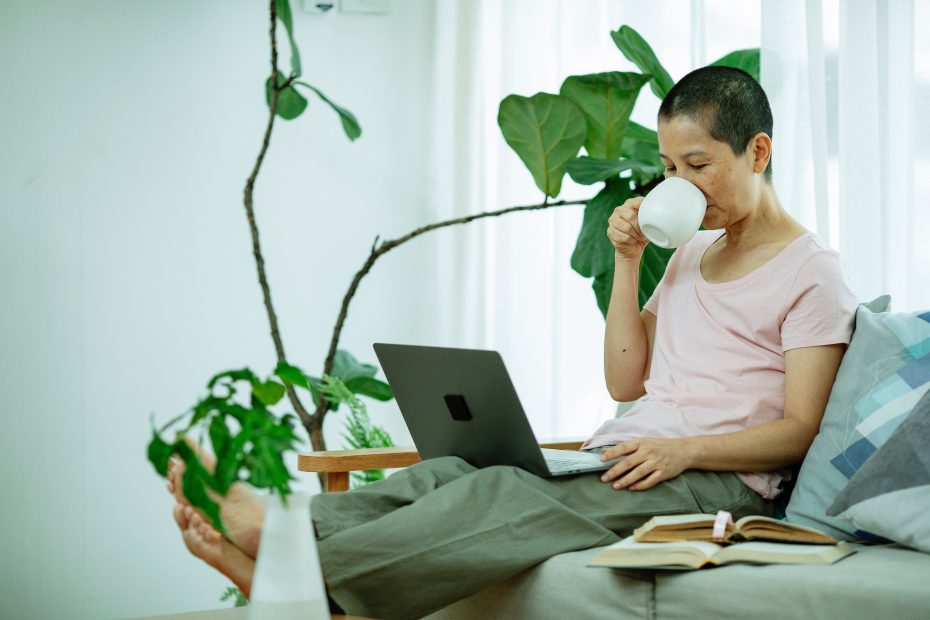Just like in many areas of life, coronavirus has changed the way many counsellors do therapy, and accelerated the transition to online ways of working. Both clients and therapists are embracing the benefits of doing therapy remotely. In this article I’ll describe some of these benefits, as well as any potential drawbacks and limitations.
The benefits on online therapy are numerous!
- A familiar environment: Many people feel safer and more relaxed in their own home, which can help if you’re nervous about opening up in therapy.
- A wider choice of therapists: you do not have to restrict yourself to only therapists who are near to you geographically. This may enable you to find a therapist with a particular specialism.
- A wider choice of modes of therapy: video, telephone, text chat, and email may be available, each of which have unique features: for example, text-based therapies allow you to review what you are saying before sending.
- Confidentiality: no chance of being seen entering your therapist’s practice. End-to-end encryption gives peace of mind.
- No commute! No need to travel to and from where your therapist works, which can save time and money. This can also make it more accessible for people with long-term conditions which make travel difficult or tiring.
Making the Most Out of Online Therapy
Online therapy is not for everyone – some people will always prefer face-to-face sessions. Some clients feel that online therapy lacks the “immediacy” of being physically present in the same room as your counsellor: this can be particularly true for clients who have experienced trauma. However, many clients feed back that they are surprised at how supportive online therapy can feel, and that the screen does not feel like a barrier. If you’re thinking about giving online therapy a try, the following tips may be helpful.
- Get comfortable: you might wish to wear comfortable clothes, grab cushions or a blanket. Ensure that you have water and tissues nearby!
- Find somewhere private: Not everyone’s living situation is suited for online therapy: if you’re doing therapy online, it’s vital that you have a safe space where you won’t be overheard or interrupted.
- Build confidence: it’s important to get familiar with the technology that you’ll be using. Your therapist should be able to talk you through any questions that you have about it.
- Keep it secure: ensure that you are using a secure Wi-Fi connection; using up-to-date virus and spyware protection; and regularly installing updates of any software you are using.
- Get a reliable connection: a robust broadband connection helps to avoid frustrations, however even the most reliable connections will fail on occasion, and this is part of the process of online therapy. As a therapist, I always ensure I have the client’s telephone number so that we can continue to talk if the internet connection fails.
- Minimise distraction:
- Book your session at a time when you will not be interrupted.
- Ensure that your phone is on silent or off, switch off notifications, and close any browser windows that might distract you.
- Some people find seeing their face in the video chat is distracting or uncomfortable – if so, you can move or hide this (you can find instructions on Google or ask your therapist how).
- Furry friends? Having your pet in your room can be comforting, but it may also distract you – consider what works for you!
- Use words! Generally online video therapy means that you can only see the top half of your therapist’s body, and vice versa. You may need to express more verbally, to make up for the lack of body language. However, you might be surprised how much non-verbal communication still happens, even online.
- Give yourself time. One of the seldom-mentioned benefits of in-person therapy is that it occurs in a specific space and time (the therapy room). If possible, it may be helpful to have your online therapy sessions in a different area of your home from where you work or study. I also encourage all clients to establish some kind of “ritual” to let themselves know that the session is over. You could try one of the following:
- “Shaking it off”
- A brief walk
- Sipping tea quietly
- Changing your clothes
- Taking some slow, deep breaths
- Putting your thoughts and feelings in a journal entry
There’s no “right” way to do therapy, but do discuss any concerns you have with your therapist, so you can find what’s right for you!
P.S. If you are looking for more tips, you might want to read my article on finding a therapist.
